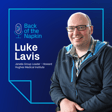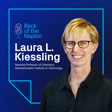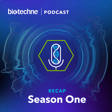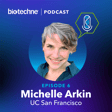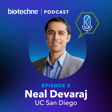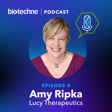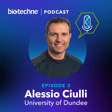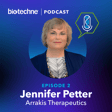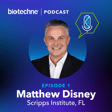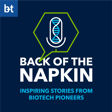Introduction to the Podcast
00:00:03
Speaker
A discovery is said to be an accident meeting a prepared mind but every story behind the discovery is different. Perhaps the idea is conceived in a light bulb moment or a brainstorming session or captured in scribblings on the back of a napkin. Here we introduce you to scientific pioneers taking you beyond their publications and into innovation corner to hear the untold stories behind their discoveries.
Guest Introduction: Professor Katherine Whitehead
00:00:33
Speaker
This podcast is brought to you by Biotechny and I'm your host, Alex Maloney.
00:00:41
Speaker
Innovation knows no bounds. It's a process of connecting ideas, relentless curiosity, and the drive to seek solutions to unanswered problems. There's a mindset and a willingness to go into the unknown that many great innovators display. And sometimes even setbacks and struggles spark innovation. And that's exactly what you'll hear from our guest today, Professor Katherine Whitehead.
00:01:10
Speaker
Catherine, or Katie, is a professor in the department of chemical engineering at Carnegie Mellon University. Now, chemical engineers build, and what Katie builds are solutions to drug delivery challenges, more specifically, delivery of RNA and proteins.
00:01:32
Speaker
Her work interfaces molecular biology and medicine to understand the relationship between delivery barriers like the intestine and the gastrointestinal tract and therapeutics.
Katie Whitehead's TED Talk on Lipid Nanoparticles
00:01:46
Speaker
An area of Katie's expertise is lipid nanoparticles, and you may recognise Katie from her viral, quite literally, TED talk during the pandemic where she communicated to a non-specialist audience how the lipid nanoparticle vaccines worked.
00:02:04
Speaker
The tiny balls of fat that could revolutionise medicine. A talk that's now been viewed well over two million times.
The Lab's Feline Mascots and Personal Stories
00:02:12
Speaker
I found this a particularly inspiring conversation. Katie gives a very honest account of the challenges of being a full-time parent, a full-time academic PI.
00:02:23
Speaker
And if you really want to know how challenging it is to give a TED Talk in the middle of a pandemic on the therapeutic solution to the pandemic, on top of all of this, well, listen in. Welcome to Back of the Napkin.
00:02:44
Speaker
Hey, Katie, welcome to Back of the Napkin. How are you? Doing all right. Thanks for having me. Great to have you here. Now, Katie, before we start, I've got to ask you about some suspect furry staff members of the Whitehead Lab I saw on your website. So can you tell me how you recruited for your QCHR and tech support roles, please?
00:03:08
Speaker
Yes, ah the recruiting was not very difficult. We went and picked up some cats. And over a period of time, it became clear what their skills were. And so when we had that opening of lab manager, um we knew who was right for the job, maxim Maximus Tuna. who I gather he's your cat, right?
00:03:35
Speaker
He is my cat, and I had another cat who passed away, unfortunately, a few years ago. He loved water, and so he was the dishwasher. And then we've had other group members with their various pets over the years who have joined our staff, and so ah there's a cat that loves to lay on keyboards, and so that cat is the part of the technical support team.
00:04:00
Speaker
Yeah, very good. Very good. um I saw on your Twitter or x whatever we're calling it now that um Maximus Tuna was also a fan of the American office, I guess because of ah big tuna, right? Right, right. That's how that's how we named him. So in 2010, you know, was it still I think it was still ongoing at that time, but we love the office. And so ah seemed like a and a good name. We wanted to incorporate the name of a fish. That's what we came up with. Yeah, very appropriate. And I shouldn't say this because I'm ah i'm a Brit, but the American office is an example of a series that the US have taken and improved. It's ah it's a really, really great series.
00:04:44
Speaker
Yes, I loved it. And now when I go back and I watch the reruns, I'm like, Oh, that's a little, I'm not sure it would be made today. Exactly. But ah yeah. Yeah. Okay.
Katie's Unconventional Path to Science
00:04:58
Speaker
All right. Okay. So let's go back a little bit in time then and tell me how you got into, into science.
00:05:05
Speaker
Sure. So I don't have the typical scientist story, I think, where you know I knew I had a passion at a young age and I was outside you know flipping over leaves and marveling over insects and so forth. I think as a child, I liked most things. And when I went to high school, I did particularly enjoy science and math, but I also enjoyed writing.
00:05:35
Speaker
and performing, actually. And so when it came time to go to college, I wasn't actually sure what to do. Should I major in English so I could have a career in writing, which I loved? Or should I go into engineering? Since I liked chemistry and math, I figured maybe I could put them together. But I didn't really know what chemical engineering was. I don't really think many high school students have a chance to understand what engineering, any kind of engineering is because it's such a hybrid. There's such hybrid disciplines.
00:06:09
Speaker
So I thought I would try engineering. I was concerned longer term about being employed and making a reasonable wage. And so ah that showed practicality. And that's what engineers are, right? We're practical. What I didn't recognize at the time was that my chosen career path would involve a lot of writing, a lot of writing, you know almost as much, I would say, as the science itself. And on top of that, there are many aspects of a job as a professor that involve performing as well. And so I guess you could say I have it all now. Very good. And so where did you go to college?
00:06:55
Speaker
I went to the University of Delaware. I grew up a little bit north of Philadelphia, and so you know I was happy to stay relatively close to home. It was about an hour, 45 minutes, and it had one of the best undergraduates, still does one of the best undergraduate programs in the country for chemical engineering. So you must have enjoyed that undergraduate studies then to go on to do a PhD next. So tell me how how that happened.
00:07:23
Speaker
Sure, it's kind of
Shift to Drug Delivery Research
00:07:24
Speaker
interesting. I didn't love chemical engineering undergraduate education. And a couple years in, I was prepared to leave the major, even though I was doing well, because I didn't enjoy yeah i just didn't enjoy learning about thermodynamics and fluid mechanics. A lot of that textbook information wasn't exciting to me. And so I had an absolutely wonderful undergraduate advisor who said to me, we need to get you into research. And so he introduced me. ah ah At the time, there weren't ah there wasn't a lot of bioengineering at that time back in, say, the year 2000, particularly not in chemical engineering departments. And so the school had just hired their first bioengineering-ish professor in the department and
00:08:16
Speaker
my advisor said, let's get you into this kind of newfangled type of of engineering research. And I turned out to really enjoy it. And I think any kind of research would have piqued my interest in the sense that it was an opportunity to work on the cutting edge, which is very different from what you see in a textbook. So I persevered with my undergraduate studies. My advisor told me, if you go to graduate school, you can go and do anything you want. And I trusted him, and I think we found out that that's true.
00:08:51
Speaker
So I was exposed briefly my senior year to a biomedical engineering class. And it just struck me that the human body is one of the most amazing engineered systems that is out there.
00:09:07
Speaker
And so that's what I wanted to study, and I wound up going to UC Santa Barbara to work with a professor in the area of drug delivery there. He is named Samir Mitragotri, and he's a drug delivery professor. He's now at Harvard, and I just loved every minute of my time there. and What problems were you looking at? or what was your What was your project?
00:09:30
Speaker
My project was to enable the oral delivery of protein drugs. So protein drugs like antibodies and insulin is a very common example. They all have to be injected. And injections as you can appreciate are not patient friendly. So we wanted to make an oral delivery version of these proteins However, that is challenging because our GI tracts are designed to digest proteins and not to absorb them. So so that's ah that's a bit of a conundrum. And I spent my PhD research and I've continued throughout my faculty career
00:10:14
Speaker
to identify ways that we can protect our protein drugs in the gastrointestinal tract, and then to increase a little bit the permeability of the intestines to enable their the drug transport into the person's body.
00:10:33
Speaker
hu um So I'm going to take you back just one step before we get to your faculty positions, but you were at MIT right before um kind of moving to your faculty position. So tell tell me about that step because that seems like a pretty important part in the journey as well.
Postdoctoral Experience at MIT
00:10:50
Speaker
It was an amazing time. And I decided after my PhD that I wanted to stay generally in the area of drug delivery. But at that time, I think genetic medicine was really just getting a foothold. And I knew that there were some people working in the area of RNA delivery, and there had been for a while longer in DNA delivery.
00:11:17
Speaker
And it just struck struck me that because of how personalized our diseases are, many of us have different types of mutations that cause disease. People who have cancer, almost every cancer is a little bit different. And it struck me that these genetic medicines were going to be the medicine of the future because they were one of the only ways that we knew of where we could correct gene mutations and to be very specific about developing the therapy to match the patient's exact needs.
00:11:59
Speaker
So I wanted to work on that, and there was a lab at MIT that was ah working in that area. So that was with Bob Langer and Dan Anderson at MIT. And they've spent the last several decades working in the area of RNA delivery, as have I now. and Yeah, I was off to the races. I learned a lot about lipid nanoparticles, which are now the FDA-approved drug delivery vehicles in the vaccines and one other RNA product that's on the market today.
00:12:35
Speaker
So that was my start. And I love being at MIT. I had a lot of freedom. And there are a lot of scientific resources there, shall we say. And the people were the best right because it it brought together such a wide range of disciplines. And you learn a lot from people who are not like yourself. So it was really a wonderful time.
00:13:00
Speaker
So you get to the end of this post-op position then and we pretty set on kind of becoming an academic. Was there any ever any consideration to kind of move into the industry?
00:13:14
Speaker
So when I was a PhD student, I felt as if I did not have enough ideas to become a faculty member. I also came up came from a relatively modest background. I wasn't exposed to a lot of professionals growing up and I didn't really know much about what the job would entail aside from observing my PhD advisor who seemed to make it all look very easy. And I didn't necessarily think research was easy, and i so I figured maybe that life as a professor wasn't for me.
00:13:50
Speaker
So my PhD advisor, he thought I'd make a good professor though and so he urged me to keep my options open and to go and do a postdoc in a lab that would help place me either in industry or in an academic position and give me the opportunity to kind of take more time to decide.
00:14:11
Speaker
So a few years into my postdoc position, I realized that I had more ideas than what I had time to pursue. And I think my creativity was still developing.
00:14:24
Speaker
And I found i I enjoyed mentoring students in the lab, ah undergraduate students working with younger graduate students. And so, you know, then it became more clear to me that this was something that I should at least try to try, right? It's hard to get these positions, but I wanted to try. So what year was it that you start your own group?
00:14:47
Speaker
It was at the end of 2012. So the fall of 2012 was when I started here at Carnegie Mellon. And it's been 12 years. 12 years. Wow. i While um doing some research into UK, I came across your blog that you used to write. There's some really fantastic articles here. And I can tell, you know when you said at the start that you like writing, I can certainly see that from um ah from this this blog.
00:15:15
Speaker
And you know I came across one of your articles, which you had titled Anger and Innovation. This was a really, really great, great article. And you know you you mentioned just a second ago about having more ideas than you were able to pursue in your postdoc.
00:15:35
Speaker
um But yeah, can we can we talk a bit more about this this article? Because it seemed like you wrote this in 2018 before you had received the n NIH new innovator award. So yeah, I'd like to kind of understand a little bit more about kind of how this all matured.
00:15:57
Speaker
Sure. So for those of you who don't know, there are a limited number of award mechanisms. you know In this country, in general, you need to have done a fair amount of research to obtain funding to do more related research. And I think that's fine, but I really like to also think of totally new things.
00:16:22
Speaker
And that can be very difficult to obtain funding for because people don't trust that you can do it if you have no experience. So I really coveted this particular award from the National Institutes of Health or and NIH.
00:16:38
Speaker
Called the new innovator award which was for earlier career faculty that had these innovative ideas without perhaps a lot of preliminary data so you know, I had tried a couple times to receive this award and I did not receive it and you get reviews you get feedback and so the time that it went through the full review process I got reviews back and You know, reviews can be brutal. I don't really know what some reviewers are thinking when they write things down. But one of these particular reviewers didn't just say the idea wasn't innovative. They said none of her ideas are innovative. And you try to take the personal element out of reviews. You try to see them.
00:17:31
Speaker
for what's constructive about them. However, this felt oddly personal. And I resented
Innovative Research Ideas and NIH Award
00:17:39
Speaker
that. I'm also a competitive person. I don't like people underestimating me, particularly when things just aren't true. And so I was very angry. I was very angry about these reviews. And I knew I still had another shot. It might have even been my last shot at the at the award. I think it was.
00:18:01
Speaker
And so, you know, I said to myself, I'm going to cook up an idea that is just so innovative that no one can look at it. You know, maybe they wouldn't fund it, but nobody could look at it and say it wasn't innovative.
00:18:17
Speaker
So that was one of the first times in my love life where I actually, it was probably not the first, but it was one of the times in my life where I was inspired or had an idea based on something in my personal life. And you know it it sparked an idea that I moved forward with. And what what what was this idea?
00:18:38
Speaker
Yeah, the idea stemmed from I had had my first child at the end of 2016, and I spent the year breastfeeding her. And I kind of despised that. It was awful. And it takes a lot of time. It's essentially a full-time job.
00:18:58
Speaker
And now they have these wireless i pumps that you can like just put in your shirt. And you can walk around and keep doing whatever activities you need to do. But at that time, everything was plugged into the wall. And you had to sit there um if you needed to pump or nursing your baby. Obviously, you're just sitting there. And so I had my left hand available. And I didn't understand why all this milk was so good for the infant given how hard it was. And so I started looking for research and the research was woefully poor. you know So I'm scrolling with my left hand and I came across some very early studies from the 1980s and a little bit later that spoke not of the nutritional components in milk, which is probably the best studied area, but the maternal cells that are in milk.
00:19:57
Speaker
And these are you know cells that could include immune cells. There were some reports that they might even include stem cells. And the very limited data that was out there, it suggested that these cells were very special, that when the infant consumed them, that they were somehow able to cross out of the gastrointestinal tract and essentially incorporate into the infant's body.
00:20:25
Speaker
And the reason this is so amazing is that proteins, I was just telling you about proteins, proteins don't cross the intestine and cells are 10 to 100 times larger than that. So what on earth was happening?
00:20:41
Speaker
you know This was fascinating. So I decided to talk about that. I decided to talk about understanding more about these cells, doing some basic science that I had never done before that other people ah weren't doing much. you know There's been more research since then and people who are working at the same time as us.
00:21:03
Speaker
But then with this longer term goal of treating the infant, if these cells were so incredibly special, could we engineer them to then somehow carry therapeutics into the infant? So I was super excited right about this particular idea and I wrote the proposal and it was one of the most difficult proposals I've ever written because I knew almost nothing about the topic, about the background, about the methods I would need to employ.
00:21:31
Speaker
But there's such a sense of accomplishment when you write one of these because you inspire yourself in the process. And it was also a beautifully written proposal. And i'm ah beautifully written proposals aren't necessarily funded proposals, but I can still be proud of my writing in the way that things kind of come out. So submitted it. I wrote that blog post you know after I submitted it. I didn't want it to be colored by whatever outcome there was. I wanted to capture how I felt at that time. And I think anger has a bad rap in general. you know The question is, what do we do with our emotions? And if we have negative, what are perceived as negative ones, can we harness them for good? And I think in this case,
00:22:24
Speaker
I wouldn't have been kind of desperately looking for an innovative idea if it weren't for that reviewer being absolutely insulting. I also wouldn't have had the idea if it weren't for my daughter, so I'm grateful. Yeah, I mean, the process of coming up with a truly innovative idea, it's you know it's it's hard, right? And you know you said you just had your your daughter, which you know there's a a huge amount, I guess, that kind of changes in your life. You're looking after a person. like So being able being able to kind of come up with this this idea that you then receive this this award for, that's that's hugely impressive. So you know is there is there kind of more to the process of coming up with a new idea that you kind of still apply day to day now? um you know I saw in that that blog post, um
00:23:17
Speaker
you know One of the sentences you say is, I've become hell-bent on innovation in my career. and um ah so yeah what does What does innovation look like to you? What does it mean to you?
00:23:32
Speaker
It just means thinking about things that people haven't thought about before. I think what I like about moving into new areas is that no matter what you find, it's important. right As engineers, a lot of times we want to make things that work. And if you can't get something to work, you might feel like a failure. However, when there's a real need, when there's a real emptiness in the literature that we know of,
00:24:00
Speaker
somebody needs to start, right? And no matter what they find, it's going to be valuable, even if it doesn't work, because it can inspire other people to do more of the same. So I think when I think about innovation, I think about you meeting a need that society has ultimately, something that's been underserved in the past or you know perhaps just not looked at from the same perspective as I have. And the other is quite honestly, amusing myself and keeping myself intellectually engaged.
00:24:36
Speaker
I actually struggle to have funding from more typical mechanisms. I am not sure why I can't write proposals for you know the and NIH's ah regular mechanisms, for example.
00:24:52
Speaker
because it's based on work that's already been done. And I just don't want to do that. It's not how my brain works. And you know I just want to do new things. So you have to look for inspiration everywhere. I try to read broadly. And some of the ideas come from from that kind of reading as well.
00:25:12
Speaker
So you received this award then and you've got funding to go and explore these these new ideas. Is it five years of funding? Is that right? for the It is. It's a very nice amount of funding and it's long enough that you can um actually make some progress. So what did you find out?
00:25:31
Speaker
We found out, first of all, that the we found out what cells are in the milk. So there were some other people that came out with papers around the same time that complimented the work that we had been doing. But we did some I had a postdoc who is very talented and he did some pretty fancy biology.
00:25:52
Speaker
by my standards to really understand what all these individual cell populations there were in milk. Because if we wanted to understand what they were doing, we felt that we had to first understand what they actually are. Are they immune cells? Are they epithelial cells? Are they stem cells, et cetera?
00:26:12
Speaker
Separately, I had another talented student who was trying to understand the milk cell fate in the infant. So what would actually happen to them? And that's where things went a little sideways compared to my original idea.
00:26:27
Speaker
What we saw was that a lot of these cells were actually being digested and using some of the more advanced characterization techniques that are available today, which people did not have 40 years ago, 30 years ago,
00:26:44
Speaker
we were seeing that it probably isn't whole cells that are crossing from the gastrointestinal tract into the infant, but rather parts of digested cells that were moving. So we're about to come out with another paper on that topic. It was a lot of work. I think it was important that we better understand this.
00:27:09
Speaker
And it doesn't mean that these cells can't be used in interesting ways. you know One might be to keep the therapy inside the gastrointestinal tract. That might work better. It's known that breast milk protects it against certain intestinal diseases that infants can develop, and so trying to find some inspiration there.
00:27:31
Speaker
However, we have done all sorts of other cool things with the money. We learned a lot about other components that are are in milk, so other types of small molecules, ah sugars for example, there are other bioactive components like They're called extracellular vesicles or exosomes. And all of these materials, many of them have very interesting and special properties compared to what else is currently available. And so we've been trying to apply them to other problems. And we've we've found some exciting solutions, I think. And we're writing up some papers on that now.
00:28:12
Speaker
And the final thing we done veered a little bit away from milk and more into the area of maternal health. So during the award I had my second child and he was born the second week of shutdown in 2020 here in Pittsburgh.
00:28:33
Speaker
And leading up to his birth, I don't know, it's just so dissatisfying to go into the doctor's office and to ask questions and, you know, can I keep taking my medication? Well, we don't we don't know. What do you mean you don't know? Does anybody know? No, nobody knows. Nobody knows anything.
00:28:52
Speaker
And then after the birth, you know, nobody knows anything then either, you know, the perinatal time period, maternal health and medicine is just, I think a terribly underserved area.
00:29:06
Speaker
And it makes sense, right? For decades and decades, it's been mostly white men who have been doing the science. And we're often inspired by things from our lives. So this is part of why diversity is so important in science. you know So anyway, we wanted to take some of the money and to begin studying what drug delivery looks like during pregnancy to better understand what do particles do, you know what do larger molecules like proteins do in a pregnant person? you know Do they accumulate in regular organs the same way? Do they enter the placenta? Do they cross the placenta, which would mean that they go into the infant? There are a lot of fundamental questions that simply you know have not been answered. And so we use that and NIH money to get started in that area.
00:29:56
Speaker
Great. And I assume that LMPs played a kind of part in in this as as well, in kind of looking at how they worked.
Explaining Lipid Nanoparticles
00:30:04
Speaker
And LMPs, lipid nanoparticles, um have been such an enabling technology. So please, could you introduce us to kind of what these are for listeners who are maybe less that familiar?
00:30:18
Speaker
Sure. So there have been versions of lipid nanoparticles. ah They've been kind of iterated upon for the last 40 years at least. And initially a lot of the work that was done with them was for DNA delivery.
00:30:33
Speaker
But we've learned a lot about how to repurpose them and how to formulate them in order to carry and protect other drug cargoes like RNA. So they're fairly complex nanoparticles. They're usually about 100 nanometers in diameter, you know preferably a bit smaller than that. And they can package up pretty much any kind of RNA that we want.
00:31:00
Speaker
and we can and treat theoretically you most things with RNA of some sort. So the question is, how do we deliver this RNA to the right places? And these lipid nanoparticles not only protect the RNA, but we can modulate their chemistry, so to tune their chemistry in order to take them to the places where we want them to go. They you know had been
00:31:34
Speaker
People did not think that they were going to be used widely in the clinic. They were first FDA approved in 2018 for a rather rare liver disease, and they were considered a bit too complex, I think, for broad use.
00:31:51
Speaker
But then came along the pandemic. And during times of desperation, people are more willing to, I think, try things that are a bit outside of the norm. And so for as horrible as the pandemic was, I think it gave us this occasion to try these particles out and really witness their power.
00:32:12
Speaker
in terms of vaccines, and we already know that they will be good for some other things, but perhaps most importantly to demonstrate their you know they're their safety really in hundreds of millions of people, if not a billion people at this point.
00:32:30
Speaker
Now, when I say safety, I mean, you know truly, like you need to be able to take the medicine without long-term issues. Of course, a lot of people have strange side effects due to the lipid nanoparticles. And there are all sorts of people working on that particular challenge right now. But broadly speaking, you know they were they they worked well in many, many people.
00:32:53
Speaker
So this is opening the floodgates. you know and Now there's a lot of money in this area, a lot of interest from companies and you know more openness of the FDA and other you know regulating bodies, more manufacturing capabilities. And so all of these resources and I think um accommodations around the world will mean that these therapeutics are going to be easier to develop moving forward. So it seems like at the moment LMPs are predominantly ending up in in the liver, right? So you know what what are the ah opportunities here? How are people thinking about steering them away from just the liver?
00:33:41
Speaker
Sure. So the liver was the first FDA-approved lipid nanoparticle, as I mentioned. And in terms of vaccines, we've found that they're going into muscle cells. They're going into immune cells to begin kicking off that immune response that we need. And those are mostly the salt cell types, if you will. But beyond that has been a little tough. So at this point,
00:34:10
Speaker
We're seeing a lot of progress in delivery to the spleen, which also has a lot of immune cells, as well as people are having success in the lungs. And it depends, I think, on a couple of things. What we've been learning is that First of all, the and the injection route or route of administration matters very much because that will determine what organs and cell types these particles are flowing past. And so when you inject something, IV,
00:34:43
Speaker
or intravenously, one of the first places it goes is the liver, and the liver is meant to filter out particles and other foreign entities. So that's what it does. It kind of gobbles them all up, and we can get great results in the liver. But what folks are finding is that we can use other injection methods. Perhaps we can inject things. You know, we do intramuscular injections for vaccines. You can do what are called subcutaneous injections, which is right under the skin. My lab has used intraperitoneal injections, which goes right into the peritoneal cavity, which surrounds a number of your organs like your kidneys and your pancreas.
00:35:25
Speaker
And you can think of putting them on the skin. You can think about consuming them orally. All these different options will take them you know fundamentally to some different places. But then the other really important element is the chemistry of the particle, which I mentioned is super complex.
00:35:43
Speaker
And we are learning that particularly the surface chemistry of these particles is affecting how they interface with biological components. So when we either inject them or somehow otherwise introduce them into the body, they are put into fluids that contain proteins.
00:36:05
Speaker
And some of these proteins are naturally drawn to the surface of the nanoparticle. And depending on the nanoparticle chemistry, the exact identity of those proteins can change. So we're learning a lot more right now about how those changes in chemistry change the proteins that sit down on the surface of the particles, and then how those proteins are helping to influence where these particles are going and where they're ultimately taken up into cells.
00:36:34
Speaker
So i'm not though you know we're not the only group here. There are many groups that are now trying to understand more about what are called protein coronas and understand how we can manipulate them to you access new targets.
00:36:49
Speaker
Interesting, really interesting insights, Katie. um And I understand that kind of one of the challenges as well is, you know, it's not just kind of delivering the LMP to the right cell, but even once they kind of get in into kind of an end zone, it's then still really hard to actually release the the payload inside the cell. So, you know, how can we think about solving this problem as well?
00:37:11
Speaker
Right. So it's a terribly inefficient process, the delivery inside of the cell, because again, these particles are foreign components and the cell is remarkably skilled at detecting things that don't belong there.
00:37:28
Speaker
So you know I think developing a lot of work has been done on one of the chemical components of the lipid nanoparticles called the ionizable lipid. It's able to become positively charged when it's in the cell inside of this vesicle called the endosome. And that can help the RNA move out into the cytoplasm of the cell, which is where it can be translated into protein or otherwise do what it needs to do.
00:38:00
Speaker
However, there are people that are taking different approaches beyond that. I just saw an abstract this morning, for example, of a new manuscript that came out where they were using a direct uptake ah from, they were using some extracellular vesicles and the cell would take them up and take that RNA up directly into the cytoplasm kind of sidestepping.
00:38:27
Speaker
this issue of the RNA going into an endosome where it is usually degraded. We have a collaboration with an investigator at Penn who is looking at the use of you know, some small molecules to facilitate that process without causing any kind of an immune response. So when these endosomes burst normally, they don't exactly burst, but when they and kind of come apart to allow the RNA out, the cell gets offended by that too. You know, that's not something that's typical. And so one of the questions is,
00:39:07
Speaker
how can we reduce any kind of negative response to the sort of delivery event is very interesting. There are a lot of things that we don't know, and I think a lot of progress to be made in the years ahead. and Yeah. And there's some really kind of complex ideas here, which, you know, I guess um kind of brings me to this other part of, you know, the importance of science communication, which I know is something that's really important to you. So these really complex ideas, like how you know, how can we get better at communicating them? I presume you may have sat through maybe a few too many talks that haven't been effective in delivering their message. So yeah, what can we do to improve science communication?
00:39:48
Speaker
I think it's a complex question that originates with many of us, you know, growing up as I'll say, but really during our student years and our early professional careers, observing lots of talks that are given by famous scientists and and trying to mimic what we see because that's you know, how we learn, right? We learn by looking at what other people are doing and, you know, wanting to be a professional and kind of fitting in. So unfortunately, many of the examples that we see are very poor in terms of their ability to
00:40:29
Speaker
to communicate the science to people who are outside of their field. you know they're not They're not universally bad communicators, right but a lot of times as scientists, we're talking to other scientists that are really in our field of research. And so and we're able to communicate well with them. But the question is, how do we communicate a little bit more broadly?
00:40:53
Speaker
And you know so this is something people need to overcome, right? And that takes a lot of effort, I think. And I noticed when I would go to conferences that even conferences in the area of drug delivery, which is broadly my area, but there are many types of drug delivery that use different types of materials and chemistries that treat different types of organs where I don't know the biology.
00:41:20
Speaker
And I'd sit in these talks and I just wouldn't understand what was going on. And it occurred to me that, you know, i'm I'm a pretty intelligent person. I should be able to understand this. And that's when I really started to notice, this was when I was a postdoc, I really started to notice the problem.
00:41:40
Speaker
And I wondered how I could better myself and make sure that my material, my research was going to be appreciated no matter what audience I was speaking to. So I think one of these first things that folks have to do is is bring on the awareness, right? You have to first recognize what the issue is and to want to change your approach. And sometimes what that means is you not following the examples that are given.
00:42:09
Speaker
And I was fortunate to come across a number of resources. During my postdoc, i went to MIT would have this, they call it, I think, the J term. But it's a period in January where they have supplemental instructions. Students can take a course. But they had a guest lecturer come in, Jean-Luc Dumont, who has devoted his career to helping people be better scientific communicators.
00:42:37
Speaker
And I saw several talks, he gave three talks while I was there. And I just thought, this is exactly right. I was just floored at how much sense it made that we had to completely change the way that we were communicating.
00:42:55
Speaker
And it's such a shame. Many of us do really, really great science. And to have only a small fraction of people be able to appreciate it, it's just such a waste. So at that point in time, I kind of set out, all right, I'm going to do the best I can. And I try to improve constantly. I'm always learning how to be a better communicator.
Communicating Complex Scientific Ideas
00:43:15
Speaker
And so it then has to be this willingness to learn continually and to put in the hard work.
00:43:21
Speaker
And that's probably the worst part. It is difficult to be a good science communicator. And so even if people want to, they'll find that they run out of time or they'll find that they're not really sure how to do it. You know, a lot of people will put a whole bunch of things on a PowerPoint slide. Let's put like lots of data. It'll look really impressive that we've done a lot of work.
00:43:47
Speaker
And then we'll put some kind of title on the slide you know that says like results, just for an example. So we've got a whole bunch of data and we've got results. And if I'm in the audience, I really don't know what any of that is. you know It looks like the person has done a bunch of work, but I don't understand it.
00:44:07
Speaker
um What I found sometimes is when I begin putting these slides together, I want to write the main point as the title. I want to write the main point of the slide. And sometimes I try to figure out, well, what is my point? And I realize I don't know what it is.
00:44:25
Speaker
So then I'm like, well, shoot, like it's really hard work. Well, what on earth is my point? right Is my point that I did a lot of work? That's not a good point. ah So how can I rework what I have on that particular slide to make my point? I first have to figure out what my point is. So it's it's a lot of work. And to design slides that are clean and in a way that you know, will be helpful to a person who is also listening to you. It's challenging. um and How do you implement this with your group? Like, presumably, you know, when you're when they're going away to conferences, you know, you make sure when you're when they're giving their kind of trial talks that they've got the point in those slides and that they're not kind of what they're delivering that message effectively.
00:45:16
Speaker
Right. It's interesting. It's become easier over time to help my students speak well and to be good communicators. I mean, writing is always a challenge for most students because it's, I think, even less intuitive. But the speaking part of things in designing high quality slides has gotten easier in the sense that when they join the group,
00:45:42
Speaker
They understand what the expectations are. And there are other students in the group who have been here longer who set good examples. They see me give talks, which also sets an example. And they know what my expectations are.
00:45:58
Speaker
So we have boot camps you know from time to time. We review some videos of Jean-Luc Dumont that are online about slide design and communicating to... It's interesting, he has this video on communicating to non-scientists, but it's how you communicate to scientists too. It's really for everybody.
00:46:21
Speaker
and knowing your audience. So that's that's probably one of the other main things, really understanding who your audience is. I try to teach them how to put themselves in other people's shoes, you know the audience's shoes, and then how to design these slides in a way that is is helpful to the audience. So we do kind of some workshops. I'll do a couple of group meetings every year where I go over some kind of relevant material that will help them. And then we do practice talks, right? And and we give feedback and we iterate and it takes time, but I think it pays off in the end. So talking about
00:47:03
Speaker
communicating as a scientist to non-scientists, you have the ultimate example of this in that you delivered a TED Talk in 2021 around LNP's.
00:47:18
Speaker
Tell me about this, because this this is a video now that's been viewed over 2 million times. So yeah, how how did this come about? Tell me about this experience. So it was really such a privilege to be asked to do that. I, as a science communicator, giving a TED Talk is one of those things you you kind of think about, right? Wouldn't that be amazing? I couldn't have envisioned that I would be giving a TED Talk any time soon. But it's a little bit, it's it's kind of a pinnacle, right, of scientific communication.
00:47:57
Speaker
So I was shocked when I was approached by, and Ted at the time would have different curators for different areas that would help speakers kind of have a small group of the speakers that they would work with on the talks and preparation and the execution. So the science curator, ah Dave DiBello at that time, he had gotten my name from a woman I met on Twitter.
00:48:26
Speaker
And it's just amazing. It's really too bad about Twitter because it was such an amazing way to meet different types of people and to have different impact than I think what what I have in any other platform. So it was kind of amazing. Yes, this woman recommended me as someone who is a good science communicator who worked in the area of lipid nanoparticles and RNA delivery.
00:48:55
Speaker
Because Ted was thinking with the rolling out of the vaccines in early 2021, it might be useful to you know have a related talk at the conference. So they reached out to me.
00:49:10
Speaker
It was by far the most challenging thing I've ever done because I barely had any time. So they reached out the second week of June. For most speakers, they usually have them lined up, I think around March. And you have to prepare a talk. I think I had like a 12 minute talk or so. So you have to come up with the material, which is multiple drafts. you know Nothing ever turns out well the first time. you know How do you speak to people? How do you say something interesting and understandable?
00:49:40
Speaker
So multiple drafts, the whole thing has to be vetted, right? Everybody wants to make sure you're saying things that are totally accurate. And then you have to memorize it and you have to memorize it in part because it's been vetted. You don't want to go off the cuff with anything. And so this was nearly an impossible feat, I think, in the time that I was given because I showed up to the TED conference, I don't know, maybe on July 29th. So I had only about six weeks to get a lot of this squared away.
00:50:14
Speaker
So I didn't love that, but what a privilege it was to be able to put it together. And um you know we we kind of got through the conference. The conference was modified because of COVID, and there weren't nearly as many people there as usual. There were more people watching remotely, um but it wasn't quite the same, I guess, as usual.
00:50:37
Speaker
And I messed up while I was giving that talk because I did not have enough time to memorize it. It's difficult to memorize something precisely. You need weeks to kind of, you know, have it, you know, to listen to it over and over again and really get it committed to memory. So I messed up and fortunately there were 500 people in the audience and, you know, the ah millions of people who have viewed it online don't see any of that, right, because they're able to cut it all out.
00:51:06
Speaker
I forgot to use my slides because it was all done so last minute that had people were supposed to make some slides like graphics for me. But that got messed up. So there's this really funny drawing of like this wavy arm in my talk that I wound up making and we put in at the last minute. But I had in practice with my slides. So I went through my whole talk and I think only at the end I remembered. So they cut out the bit where I was like, oh my God, my slides. like And they're able to you know they're able to insert those slides when it goes up online. So it was not without its ah challenges. um But what a privilege it was. You can control for the effective science communication piece. That's in your in your power. And you know I thought you did a fantastic job of delivering the version. I saw it was was incredible. um Yeah, the technical glitches and all those other things, like you know they're less boring.
00:52:04
Speaker
um But how how was that then after this? you know You've given a talk that's been viewed by 2 million people, that's the population of Latvia or something like that. right How was it being in public eye after this? Yeah, it was it's a mix mixed bag, I suppose. um I think Ted kind of on purpose and most of the content of my talk, and Ted kind of on purpose didn't want to advertise it as a vaccine talk per se. And I didn't really want it to be that either because I'm not a vaccine expert. I understand a lot about the mRNA vaccines that we've been using, but you know historically I'm not somebody who knows a lot about immunology. and I know about the delivery.
00:52:53
Speaker
And I know at the time that a lot of people were, you know, know your audience. I knew my audience was afraid. They were afraid of these vaccines that you could help the whole world.
00:53:05
Speaker
So the goal of this talk really was to help people feel less afraid and to help people feel more comfortable with these you know vaccines that were available to us. And then also to feel some hope um that out of all of this horribleness, you know something good was going to come down the road. So those were the messages I wanted to communicate and you can help people feel less afraid by simply explaining to them what is in the product you know in a way that they can understand. So I was super proud of that. I was very proud. The whole thing had been stressful, but you know I got so much positive feedback afterwards from and people that I knew and some people that I didn't know that I just felt
00:53:55
Speaker
again, really privileged to have had that opportunity to hopefully help people and some in some small way. um i i would get you know There were certainly people who would email me and call me who were conspiracy theorists, and and there were certainly some of that. But I think, again, because of the way the talk was marketed, I missed and a fair amount of that.
00:54:21
Speaker
I did try to get the university to take my office number off of everything. Unfortunately, it's still you know up there. um But the the calls have also tapered since then. you know And the the emailers are tricky. They'll start by asking. A lot of people just have questions right after they look at the talk. and well I get emails about science questions. I get emails about like wanting medical advice, which vaccine should I get? And then I just say, you know I'm not allowed to give you medical advice, but here's what I can tell you about each of the vaccines. So that was kind of you know the the immediate attention. um you know There's a TED Radio Hour. i've a I have an opportunity to speak to
00:55:10
Speaker
a whole bunch of you know very big companies and investors coming up, which is going to be an interesting audience. I really like the challenge of speaking to new audiences. And they found me because of the TED Talk.
00:55:26
Speaker
So sometimes it's hard to know how something has affected your career because people don't always tell you, you know, oh, I know you from the TED Talk or, you know, this and that. ah So it might be trickle down. But occasionally there will be some opportunity that comes up and it can be directly linked. So I'm also grateful for that.
00:55:46
Speaker
Exciting, exciting.
Future of Drug Delivery and Genetic Medicine
00:55:48
Speaker
um We are coming towards the end of the podcast, Katie, but I do want to get your kind of thoughts and perspectives on you know the future of drug delivery. What have we got to look forward to in kind of the next five to 10 years? What are the biggest opportunities in your opinion?
00:56:03
Speaker
Sure. So you know again, it's, I think, genetic medicine that we're really going to see some major advances rolling out therapies for other types of diseases. Vaccines have always been at the forefront. They're kind of the area in RNA delivery that people have been working on the longest, which You know, the the particles can cause a bit of immune response, and a lot of times with vaccines, it helps to kind of kick start the immune response a little bit. For those of you who know the term adjuvant, some of these lipids can
00:56:40
Speaker
act as adjuvants. And so vaccines have kind of been where people have been at the longest. So they're working on flu vaccines. They're working on universal flu vaccines, which would be amazing because we wouldn't have to guess at what strains are going to be out there.
00:56:57
Speaker
you know We could just take one. They're looking at combination vaccines. They're looking at vaccines for pretty much every disease under the sun, even things that aren't caused by viruses, you know um different types of parasitic you know diseases, malaria, some of these other things.
00:57:14
Speaker
So you know all of that I think is on the horizon. The other type of vaccine that people are looking at is cancer vaccines. um So you know a type of training of our immune system to detect certain types of cancers and to kill them. So I think all of these are a little bit further ahead than some of the other therapies that might be out there. um And then there are other areas of drug delivery that are how poised for incredible breakthroughs, particularly in you know protein therapeutics, antibody treatments, again, a lot that are cancer specific. And there are so many different nuances to treating cancer. um you know I think the future is bright. Yeah, lots to lots to look forward to. Yeah, I'm certainly excited to see what, um yeah,
00:58:10
Speaker
like What happens? It'll be great. um So, Kate, I know you've been incredibly busy recently, like you've organized a Gordon Research Conference, a Keystone meeting, so I can tell kind of this bandwidth has been really, really stretched. But, um you know, having been back and read your blogs, is this something you might think about picking up again as a little more bandwidth tags? I honestly, I'm not just saying this, I absolutely loved reading them. They're so well written. and so informative. There's satire in there, there's anecdotes, there's everything.
00:58:45
Speaker
I love it. I think about, you know, I think about going back to it and writing again. And, you know, i as you say, I try to incorporate humor. I don't know how to get through life, honestly, without without humor. So I'd love to. I can't promise it because of all the other things that I have to write for this job. um But I know I'd be happy if I if i made the time. the The problem is small children become your hobby. they are They require just so much tending to an effort that they suck up all the time. Because I used to go home, I used to write in the evenings. That's when I would write. I would have dinner and I'd sit down at the computer and I'd i you know type these these things up. So, you know, one day for sure. Yeah, I hope so. How can people follow what you're doing, Katie? How can people keep on on top of it?
00:59:43
Speaker
Sure. I mean, you know, the literature the literature at this point, i i I have been threatening myself to update my website. I've become also turned into one of those more senior professors that just lets their website go. But I've been meaning to keep it updated with yeah I do a fair amount of science communication things like like this, um other types of talks, and so I wanted to put up a media section on my website to kind of help people learn more about what we're doing in an accessible way. But without Twitter, I just haven't moved to another platform.
01:00:24
Speaker
And honestly, my mental health has been better for it. and I'm not exposed to a lot of the other, you and some of the negativity that's on there, and you know academics are competitive, and so I can kind of shield myself from some of those influences. And of course, people can invite me to come and give talks if they if they really want to um see the work up close. but Yeah. Great. Well, we will certainly leave a link to your lab website in the show notes of this episode and I think to your Ted talk as well. I'm sure everybody's probably already seen it, you know, kind many millions have already. Um, but yeah, I guess the last thing for me to ask you then is we have sent you, um, a back of the napkin napkin so that you can personalize this in some way with, you know, a nod to kind of,
01:01:16
Speaker
There it is for people watching, Katie's holding it up. But yeah, for you to personalize that with, you know, something personal to you, maybe a nod to kind of what sort of innovation has has looked like. And we will then share that kind of on our social platforms, et cetera, and on the on the website. So yeah, I really look forward to seeing what that is, Katie. And thank you so much for giving the time to this. It's been truly fascinating to to speak to you. So thank you so much.
01:01:43
Speaker
Yeah, thank you so much for having me. I appreciate it. Thanks, Katie. Thanks for listening to this episode of Back of the Napkin. To hear more stories of innovation and discovery just like this, subscribe to Back of the Napkin on Apple Podcasts, Spotify, Stitcher, or wherever you get your podcast from. If you enjoyed this episode, please consider sharing it with your friends, colleagues, or lap mates.
01:02:12
Speaker
The back of the napkin is made possible by Biotechny where we believe that purposeful innovation leads to better answers. Biotechni is a global developer, manufacturer and supplier of high quality reagents, analytical instruments and precision diagnostics. You can learn more about Biotechni and our brands like R&D Systems, Novus Biologicals, Tokris Bioscience, ProteinSimple, Advanced Cell Diagnostics, Exozome Diagnostics,
01:02:44
Speaker
asturogen and lunaphore by visiting

